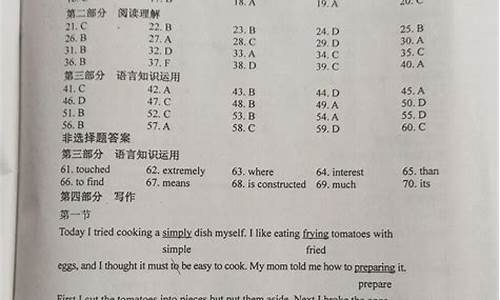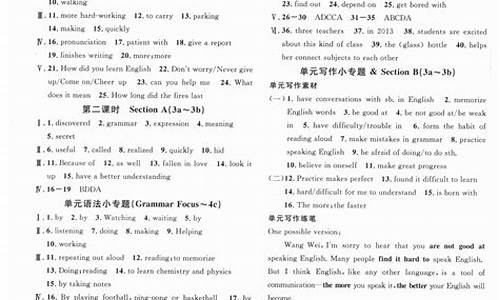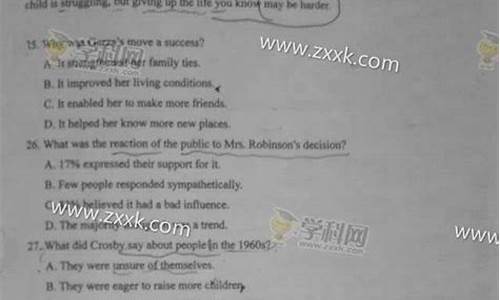您现在的位置是: 首页 > 高考调剂 高考调剂
高考英语试卷2017全国卷-17高考英语试卷
tamoadmin 2024-08-16 人已围观
简介1.浙江高考英语阅读题附答案2.高考英语常见词汇3.山东高考英语难吗20234.求英语高考题精选15道5.高考英语听力真题「全国I卷」6.近五年高考英语全国1卷百度云?浙江高考英语阅读题附答案 浙江高考英语阅读精选题附答案 阅读能力是浙江高考英语考察的重要英语能力,提高英语阅读能力十分重要。下面我为大家带来浙江高考英语阅读精选题,欢迎同学们阅读练习。 浙
1.浙江高考英语阅读题附答案
2.高考英语常见词汇
3.山东高考英语难吗2023
4.求英语高考题精选15道
5.高考英语听力真题「全国I卷」
6.近五年高考英语全国1卷百度云?
浙江高考英语阅读题附答案

浙江高考英语阅读精选题附答案
阅读能力是浙江高考英语考察的重要英语能力,提高英语阅读能力十分重要。下面我为大家带来浙江高考英语阅读精选题,欢迎同学们阅读练习。
浙江高考英语阅读精选题(一)
I was due to take my driving test at 11:30 am.It was a rainy morning with low clouds and as I roached the driving school at 9:50 am,my heart sank.My driving instructor. Stan,said something,trying to drive away my fears,but I was not impressed
We set off for the test centre with an hour to go I wanted a run round the test circuit (圈),but we got stuck in a traffic jam,and could only drive no faster than walking.
We arrived at the test centre at 11 am.Stan made me watch a group of six learners emerging from the building with their respective(各自的)examiners.Their instructors were looking out from two windows.We watched them drive off They must he been feeling very nervous
Stan took me round the probable test track,pointing out the traps.The weather became even worse It seemed to make me feel worse too.I had developed a couldn't-care-less mood,and was almost calm We returned to the test centre in time to see the six unfortunates returning.Their nerves must he been in a terrible state.
I sat in the waiting room until six examiners came in to call out our respective names. Mine showed no emotion as he asked me to go to my car I showed none either,but the tension began mounting again.
1.On their way to the test center,Stan tried to comfort the author_________
A.but it made the author's heart sink deeper
B.but the words produced no effect
C.so that the author could drive to the center with no fears
D.so that they could prepare for all he flaps
2.Which of the following is TRUE according to the passage?
A.Six learners would be tested at the same time.
B.The learners were tested in the presence of their instructors
C.None of the six learners passed the test in the end.
D The instructors were as nervous as the learners
3.When the author was sitting in the waiting room,he was quite_________
A.upset B.nervous C.frightened D.relaxed
4.When it was his turn to take the test,the author went to his car with___________
A.firm confidence B mixed emotions C.increased nervousness D.perfect calmness
5.The passage is mainly about___________
A.the influence of bad weather upon a test taker
B the feelings of a learner before his driving test
C the preparations before a driving test
D.an unforgettable day
浙江高考英语阅读精选题答案
1.B
2.A
3.D
4.C
5.B
浙江高考英语阅读精选题(二)The evidence for harmony may not be obvious in some families. But it seems that four out of five young people now get on with their parents, which is the opposite of the popularly-held image(形象)of unhy agers locked in their room after endless family quarrels.
An important new study into age attitudes surprisingly shows that their family life is more harmonious than it has ever been in the past."We were surprised by just how positive today's young people seem to be about their families," said one member of the research team. "They're expected to be rebellious(叛逆的)and selfish, but actually they he other things on their minds: they want a car and material goods, and they worry about whether school is serving them well. There's more negotiation(商议)and discussion between parents and children, and children expect to take part in the family decision-making process. They don't want to rock the boat."
So it seems that this generation of parents is much more likely than parents of 30 years ago to treat their children as friends."My parents are hy to discuss things with me and willing to listen to me," says 17-year-old Daniel Lazall. "I always tell them when I'm going out clug. As long as they know what I'm doing, they're fine with it." Susan Crome, who is now 21, agrees. "Looking back on the last 10 years, there was a lot of what you could call negotiation. For example, as long as I'd done all my homework, I could go out on a Saturday night. But I think my grandparents were a lot stricter with my parents than that."
Maybe this positive view of family life should not be unexpected. It is possible that the idea of age rebellion is not rooted in real facts. A researcher comments,"Our surprise that agers say they get along well with their parents comes because of a brief period in our social history when agers were regarded as different beings. But that idea of rebelling and breaking away from their parents really only hened during that one time in the 1960s when everyone rebelled. The normal situation throughout history has been a smooth change from helping out with the family business to taking it over."
1.What is the popular image of agers today?
A.They worry about school.
B.They dislike living with their parents.
C.They he to be locked in to oid troubles.
D.They quarrel a lot with other family members.
2.The study shows that agers don't want to__________ .
A.share family responsibility
B.cause trouble in their families
C.go boating with their family
D.make family decisions
3.Compared with parents of 30 years ago, today's parents__________ .
A.go to clubs more often with their children
B.are much stricter with their children
C.care less about their children's life
D.give their children more freedom
4.According to the author, age rebellion__________ .
A.may be a false belief
B.is common nowadays
C.existed only in the 1960s
D.resulted from changes in families
5.What is the passage mainly about?
A.Negotiation in family.
B.Education in family.
C.Harmony in family.
D.Teenage trouble in family.
浙江高考英语阅读精选题答案
1.D
2.B
3.D
4.A
5.C
;高考英语常见词汇
高考英语常见词汇
在历年的高考英语试卷中,有很多词汇是常见的,为了帮助大家备考2017年的高考,我分享了这些常见词汇,希望能帮到大家!
1.alter v. 改变,改动,变更
2.burst vi./n. 突然发生,爆裂
3.dispose vi. 除掉;处置;解决;处理(of)
4.blast n. 爆炸;气流 vi. 炸,炸掉
5.consume v. 消耗,耗尽
6.split v. 劈开;割裂;分裂 a.裂开的
7.spit v. 吐(唾液等);唾弃
8.spill v. 溢出,溅出,倒出
9.slip v. 滑动,滑落;忽略
10.slide v. 滑动,滑落 n. 滑动;滑面;幻灯片
11.bacteria n. 细菌
12.breed n. 种,品种 v. 繁殖,产仔
13.budget n. 预算 v. 编预算,作安排
14.candidate n. 候选人
15.campus n. 校园
16.liberal a. 慷慨的;丰富的;自由的
17.transform v. 转变,变革;变换
18.transmit v. 传播,播送;传递
19.transplant v. 移植
20.transport vt. 运输,运送 n. 运输,运输工具
21.shift v. 转移;转动;转变
22.vary v. 变化,改变;使多样化
23.vanish vi. 消灭,不见
24.swallow v. 吞下,咽下 n. 燕子
25.suspicion n. 怀疑,疑心
26.suspicious a. 怀疑的,可疑的
27.mild a. 温暖的,暖和的;温柔的,味淡的
28.tender a. 温柔的;脆弱的
29.nuisance n. 损害,妨害,讨厌(的人或 事物)
30.insignificant a. 无意义的,无足轻重的;无价值的
31.accelerate vt. 加速,促进
32.absolute a. 绝对的,无条件的;完全的
33.boundary n. 分界线,边界
34.brake n. 刹车,制动器 v. 刹住(车)
35.catalog n. 目录(册) v. 编目
36.vague a. 模糊的,不明确的
37.vain n. 徒劳,白费
38.extinct a. 绝灭的,熄灭的
39.extraordinary a. 不平常的,特别的,非凡的
40.extreme a. 极度的,极端的 n. 极端,过分
41.agent n. 代理人,代理商;动因,原因
42.alcohol n. 含酒精的饮料,酒精
43.eal n./vi. 呼吁,恳求
44.reciate vt. 重视,赏识,欣赏
45.rove v. 赞成,同意,批准
46.stimulate vt. 刺激,激励
47.acquire vt. 取得,获得;学到
48.accomplish vt .完成,到达;实行
49.network n. 网状物;广播网,电视网;网络
50.tide n. 潮汐;潮流
51.tidy a. 整洁的,整齐的
52.trace vt. 追踪,找到 n. 痕迹,踪迹
53.torture n./vt. 拷打,折磨
54.wander vi. 漫游,闲逛
55.wax n. 蜡
56.wee v. 织,编
57.preserve v. 保护,保存,保持,维持
61. abuse v. 滥用,虐待;谩骂
62. academic a. 学术的;高等院校的;研究院的
63. academy n. (高等)专科院校;学会
64. battery n. 电池(组)
65. barrier n. 障碍;棚栏
66. cargo n. (船、飞机等装载的)货物
67. career n. 生涯,职业
68. vessel n. 船舶;容器,器皿;血管
69. vertical a. 垂直的
70. oblige v. 迫使,责成;使感激
71. obscure a. 阴暗,模糊
72. extent n. 程度,范围,大小,限度
73. exterior n. 外部,外表 a. 外部的,外表的
74. external a. 外部的,外表的,外面的.
75. petrol n. 汽油
76. petroleum n. 石油
77. delay vt./n. 推迟,延误,耽搁
78. decay vi. 腐烂,腐朽
79. decent a. 像样的,体面的
80. route n. 路;路线;航线
81. ruin v. 毁坏,破坏 n. 毁灭,[pl.]废墟
82. sake n. 缘故,理由
83. satellite n. 卫星
84. scale n. 大小,规模;等级;刻度
85. temple n. 庙宇
86. tedious a. 乏味道,单调的,
87. tend vi.易于,趋向
88. tendency n.趋向,趋势
89. ultimate a. 极端的,最大的,最终的 n. 极端
90. undergo v. 经历,遭受
91. abundant a. 丰富的,充裕的,大量的
92. adopt v. 收养;用;纳
93. adapt vi. 适应,适合;改编,改写 vt. 使适应
94. bachelor n. 学士,学士学位;单身汉
95. casual a. 偶然的,碰巧的;临时的;非正式的
96. trap n. 陷阱,圈套 v. 设陷阱捕捉
. vacant a. 空的,未占用的
98. vacuum n. 真空,真空吸尘器
99. oral a. 口头的,口述的,口的
100. optics n. (单、复数同形)光学
;山东高考英语难吗2023
总体上来说,2023年山东高考英语难度适中。
2023年山东高考英语试题分析:
2023年山东高考英语试卷整体难度适中,注重学科能力的综合运用。其中阅读理解部分侧重要求考生把握篇章整体信息,注意语境线索,并仔细审题和提取重要信息点。
此外,为了加强考查学科关键能力的有效性,山东高考英语试卷加强了试题情境设计,并设置了复杂情境来综合考查学科能力的运用。这样的设计旨在更全面地评估考生的语言能力和综合应用能力,要求考生在实际情境中进行语言理解和运用,展示他们的语言技能和思维能力。
个体与英语试题难易程度的关系:
就考生个体而言,2023年山东高考英语试题的难易程度与考生对知识点的掌握程度、对题目类型的熟悉程度以及个人的临场发挥等因素相关。此外,考生的现场状态也至关重要,良好的心理状态和自信心有助于应对考试挑战。
2023年山东高考相关安排:
山东高考科目与时间:
1、6月7日:上午9:00—11:30考语文科目;下午15:00—17:00考数学科目。
2、6月8日:下午15:00—17:00考外语科目。
3、6月9日:上午8:30—9:30考物理科目;中午11:00—12:00考政治科目;下午15:00—16:00考化学科目。
4、6月10日:上午8:30—9:30考历史科目;中午11:00—12:00考生物科目;下午15:00—16:00考地理科目。
山东高考分数线:
1、一段线:443分。一段线是指普通类考生参加本科批次录取的最低分数线,包括本科提前批、本科普通批、艺术本科A、艺术本科B、体育本科批、技能高考本科批等。
2、二段线:150分。二段线是指普通类考生参加高职高专批次录取的最低分数线,包括高职高专提前批、高职高专普通批、艺术高职高专批、体育高职高专批、技能高考高职高专批等。
以上数据出自有途教育、中国新闻网。
求英语高考题精选15道
.(10福建25)
Lots of rescue workers were working around the clock, supplies to Yushu, Qinghai
Province after the earthquake.A. sending B. to send C. hing sent D. to he sent答案:A
考点:非谓语动词
解析:表示伴随。从 “were working”可以判断是进行时态,排除C。
2.(10福建34)
In April, thousands of holidaymakers remained abroad due to the volcanic ash cloud.A. sticking B. stuck C. to be stuck D. to he stuck答案:B
考点:remain后接动词的用法
解析:remain是高考的重点词汇。当它做系动词时,后面接过去分词作表语。
3.(10上海33)
Lucy has a great sense of humor and always keeps her colleagues with her stories.
A. amused B. amusing C. to amuse D. to be amused
答案:A
考点:本题考查非谓语动词。
解析:keep+sb. /sth. +done,根据句意,sb.与它后面的动词成被动关系,故选A.
4.(10上海35)
the city center, we saw a stone statue of about 10 meters in height.
A. Approaching B. Approached C. To roach D. To be roached
答案:A
考点:本题考查非谓语动词。
解析:考察现在分词作状语,表示正在进行或主动的动作。此时分词的逻辑主语就是主句的主语,因此要注意人称、时态和语态的一致性。
5. (10上海40)
Thai is the only way we can imagine the overuse of water in students' bathrooms.
A. reducing B. to reduce C. reduced D. reduce
答案:B
考点:此处考查非谓语动词。
解析:此处应该用不定式the way to do sth表示做……的途径、方式。the only way to do……,we can imagine 做定语,前面省略了that.
6.(10安徽30)
He had a wonderful childhood, _____with his mother to all corners of the world
A. trel B. to trel C. treled D. treling
答案:D.
考点:本题考查非谓语动词作状语。
解析:主语(he)与动词trel之间存在主动关系,故用treling作原因状语。
7.(10湖南21)
Listen! Do you hear someone for help?
A. calling B. call C. to call D. called
答案:A
考点:考查非谓语动词。
解析:该空在句中为非谓语动词作宾补,根据 someone与call的主动关系排除D项。Hear
后接不定式作宾补时应省略to,由此排除C项。由Listen可判断此处表示正在求救,故
选A项。
8.(10湖南26)
Dina, for months to find a job as a waitress, finally took a position at a local advertising agency.
A. struggling B. struggled C. hing struggled D. to struggle
答案:C
考点:考查非谓语动词。
解析:该空,分词短语作时间状语,其逻辑主语Dina与struggle为主动关系,故排除B项。由剧中的finally可知非谓语动词表示的动作发生在句中谓语took a position之前,故用现在分词的完成主动式。
9.(10湖南30)
So far nobody has claimed the money in the library.
A. discovered B. to be discovered
C. discovering D. hing discovered
答案:A
考点:考查非谓语动词
解析:该空在句中作后置定语修饰the money,根据the money与discover的被动关系,排除C、D两项。B项表示的是“将要被发现”的意思,根据句意“到目前为止还没有人来认领在图书馆被发现的钱”可判断选A项。
10.(10江西24)
The lady walked around the shops, _______ an eye out for bargains.
A keep B kept C keeping D to keep
答案:C
考点:考察非谓语。
解析:句子主语lady和keep 之间是主动关系, 而且walk和keep 同时发生。
11.(10江西32)
There were many talented actors out there just waiting ______.
A to discover B to be discovered
C discovered D being discovered
答案:B.
考点:考察非谓语。
解析:演员等待被发现, 用被动, 发现发生在等待之后, 所以用不定式.
12.(10山东23)
I he a lot of readings _____ before the end of this term.
A. completing B. to complete
C. completed D. being completed
答案:B
考点:本题考查非谓语动词的使用。
解析:句意应为“这个学期结束前,我要做很多阅读练习。”由于时间状语before the end
of this term表达未来的时间,所以空格处使用动词不定式表示将来,充当readings的定
13. (10天津12)
It rained heily in the south, serious flooding in several provinces.
A. caused B. hing caused C. causing D. to cause
答案:C.
考点:考查非谓语动词。
句意:南方下了大雨,在几个省区造成严重洪灾。
解析:空格后serious flooding是rained heily的后果,而且句子主语it和cause之间存在主动关系,所以此处要用动词的ing形式作结果状语
14.(10四川4)
A great number of students said they were forced to practise the piano.
A. to question B. to be questioned
C. questioned D. questioning
答案:C
考点:考查非谓语动词作定语。
解析: question与students 存在被动关系,question表示的动作也已完成,故用过去分
词。
15.(10四川17)
The lawyer listened with full attention, to miss any point.
A.not trying B.trying not
C.to try not D.not to try
答案:B考点:考查现在分词短语做伴随状语及动词不定式的否定式。
解析:句中listen和try not to miss为同时进行的动作,故用现在分词的一般式做伴随状语。又动词不定式的否定式要在其前加not.故选B。
高考英语听力真题「全国I卷」
第一部分 听力(共两节,满分30分)
做题时,先将答案标在试卷上。录音内容结束后,你将有两分钟的时间将试卷上的答案转涂到答题卡上。
第一节(共5小题;每小题1.5分,满分7.5分)
听下面5段对话。每段对话后有一个小题,从题中所给的A、B、C三个选项中选出最佳选项,并标在试卷的'相应位置。听完每段对话后,你都有10称钟的时间来回答有关小题如阅读下一小题。每段对话仅读一遍。
例:How much is the shirt?
A. £19.15. B. £9.18. C. £9.15.
答案是 C。
1. What does the woman want to do?
A. Find a place. B. Buy a map. C. Get an address.
2. What will the man do for the woman?
A. Repair her car.
B. Give her a ride..
C. Pick up her aunt.
3. Who might Mr. Peterson be?
A. A new professor.
B. A department head.
C. A company director.
4. What does the man think of the book?
A. Quite difficult..
B. Very interesting.
C. Too simple.
5. What are the speakers talking about?
A. Weather.
B. Clothes.
C. News.
第二节(共15小题;每小题1.5分,满分22.5分)
听下面5段对话或独白。每段对话或独白后有几个小题,从题中所给的A、B、C三个选项
中选出最佳选项,并标在试卷的相应位置。听每段对话或独白前,你将有时间阅读各个小题,每
小题5秒钟;听完后,各小题将给出5秒钟的作答时间。每段对话或独白读两遍。
听第6段材料,回答第6至7题。
6. Why is Harry unwilling to join the woman?
A. He has a pain in his knee.. B. He wants to watch TV. C. He is too lazy.
7. What will the woman probably do next?
A. Stay at home. B. Take Harry to hospital. C. Do some exercise.
听第7段材料,回答第8 、9题。
8. When will the man be home from work?
A. At 5:45. B. At 6:15. C. At 6:50.
9. Where will the speakers go ?'
A. The Green House Cinema. B. The New State Cinema . C. The UME Cinema.
听第 8段材料,回答第 10至 12题。
10. How will the speaker go to New York?
A. By air. B. By taxi. C. By bus.
11. Why are the speakers making the trip?
A. For business.
B. For shopping.
C. For holiday.
12. What is the probable relationship between the speakers?
A. Driver and passenger
B. Husband and wife.
C. Fellow workers.
听第 9段材料,回答第 13至 16题。
13. Where does this conversation probably take place?
A. In a restaurant. B. In an office. C. In a classroom.
14. What does John do now?
A. He?s a trainer. B. He?s a tour guide. C. He?s a college student.
15. How much can a new person earn for the first year?
A. $10,500. B. $ 12,000. C. $ 15,000.
16. How many people will the woman hire?
A. Four. B. Three. C. Two.
听第10段材料,回答第17至20题。
17. How long has the speaker lived in a big city?
A. One year.
B. Ten years.
C. Eigh years.
18. What is the speaker?s opinion on public transport?
A. It?s comfortable. B. It?s time-sing. C. It?s cheap.
19. What is good about living in a small town?
A. It?s safer. B. It?s healthier. C. It?s more convenient.
20. What kind of life does the speaker seem to like most?
A. Busy. B. Colourful C. Quiet.
参考答案:
1-5 ABCBA 6-10 BCACA 11-15 ACBCA 16-20CBCAB
近五年高考英语全国1卷百度云?
2020年全国高考I卷英语高考真题及答案 百度网盘
链接: s://pan.baidu/s/13npbcOt4lihC-Kzo8cBb5A
提取码: y9q8若有问题欢迎追问~









